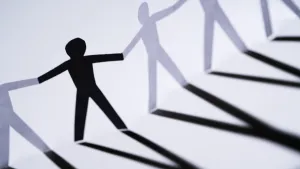Editorial Note
Thank you to our generous sponsors, Sociologists for Women in Society, Center for Equity Education, American Sociological Association’s Section on Sociological Practice & Public Sociology, Hartman Castle Preservation Corporation, Island Acres Resort Motel, Alpha Kappa Delta, Pacific Sociological Association, and the Association for Applied & Clinical Sociology for helping us make Applied Worldwide’s 2024 “Why is Sociology Important?” student essay competition a success!
This essay on the importance of sociology has been published on behalf of Applied Worldwide’s 2024 Global Student Essay Competition. For the 2024 competition, we awarded 16 student essayists across six countries and will be sharing each winning essay in our “Why is Sociology Important?” essay collection.
This sociology essay was written by Ajayi Florence, a 2nd year student of public and international law at Joseph Ayo Babalola University in Nigeria and earned a 3rd place prize in the competition.
Why is Sociology Important? Lessons from Nigeria, Ajayi Florence
“I know that I am intelligent because I know that I know nothing”—is a remarkable work of Socrates that holds water and bears seasonable relevance as I reflect on the topic of this essay contest. As I stumbled on this word, I have come to realize that Socrates, with his exceptional knowledge, was not trying to provoke confusion but instead was speaking the truth that our knowledge as human beings is incomplete compared to what is yet to be discovered. In my case, what was yet to be discovered was the immense opportunities and reliable potential that can be unlocked from sociology. Out of curiosity, I obeyed the research call to give answers to the question —Why is sociology important? In this light, the ensuing discourse will bring Socrates word to a test as we journey to discover the importance that sociology holds not only in its simplicity but in its complexity to serve as a workable solution for order that answers to the problems of the world without raising questions of applicability in an increasingly globalizing world where our shared ideals are becoming more of the rule than the exception.
The reasons why sociology important
To begin as a matter of fact, it is necessary to state that sociology is a social science that studies society in general. It is important in so many ways because it pertains to every area of life and offers great benefits of stability and prosperity to various fields of human endeavor. For instance, in the educational sector, the backbone and building blocks for all other sectors, sociology helps students, professionals, educationists, changemakers, policymakers, and other key players in the educational sector understand the existing educational challenges, provide solutions to these problems, and arrange a blueprint for creating an inclusive, innovative, and transformative learning environment. In the same vein, it helps these players comprehend the connection between the society and the educational system.
How does this work if you ask me?
To comprehend the connection between the society and the educational system, sociology sheds light on the intricate relationship between them by analyzing the different aspects of this connection, particularly those that spark curiosity and prompt deeper investigation. If, for example, as a student of political science, I want to make research findings on the impact of Nigeria’s educational equality on women’s roles and positions in Nigerian politics, sociology would provide valuable insights into the specific aspects of education that perpetuate educational inequality. It is these valuable insights that will give answers to how factors like socioeconomic status, race, gender and ethnicity are playing a problematic role in affecting access to quality education and the equal positioning of the female gender in Nigerian politics. This research finding will not only benefit me but also educators and policymakers who are interested in addressing the inequality gap in Nigerian politics and working towards more equitable learning opportunities for all, irrespective of their socio-economic status, race, gender and ethnicity. Moreover, since change is infectious, other African countries will start making efforts when the readiness to address the inequality gap through the lens of educational sociology becomes apparent in Nigeria. This is because, when we realize the weight of these benefits, we will at the same time realize the truth when John Dewey said: “Education is a social process; education is growth; education is not a preparation for life; education is life itself.”
Secondly, sociology is important because it focuses on how it can positively impact human lives in the society. It does this by focusing on public institutions that directly influence human lives and how they can be improved to promote the quality of life in the society. For example, by embracing sociology conceptions, public institutions like the Nigeria Ministry of Environment and Natural Resources will have a better understanding of social structures to evenly distribute resources in the country, particularly in low-income earning regions where there is a dearth of poor infrastructural facilities and the standard of living is incredibly low. Likewise, in the health sector, sociology, through its medical sociological lens, is important in helping the ministry of health and other health agencies undertake necessary actions that will strengthen the national health system to be able to deliver effective and affordable health services that foster the improved health status of Nigerians. It does this by providing public health workers with a study of the prevalence, causes, and associated perspectives of disease and illness and the overall link between society and their well-being. For instance, according to the Federal Government of Nigeria, there is an estimated 55 million cases of malaria and nearly 90,000 malaria deaths occur each year in Nigeria—a consequence of an open refuse site, a blocked drainage system, and an unkempt environment that has aided their breeding. As a workable solution, sociology tackles malaria by fostering a deep understanding of local preventive practices and healthcare-seeking behaviors. This in turn will unequivocally empower policymakers, public health workers, and the public to implement effective intervention.
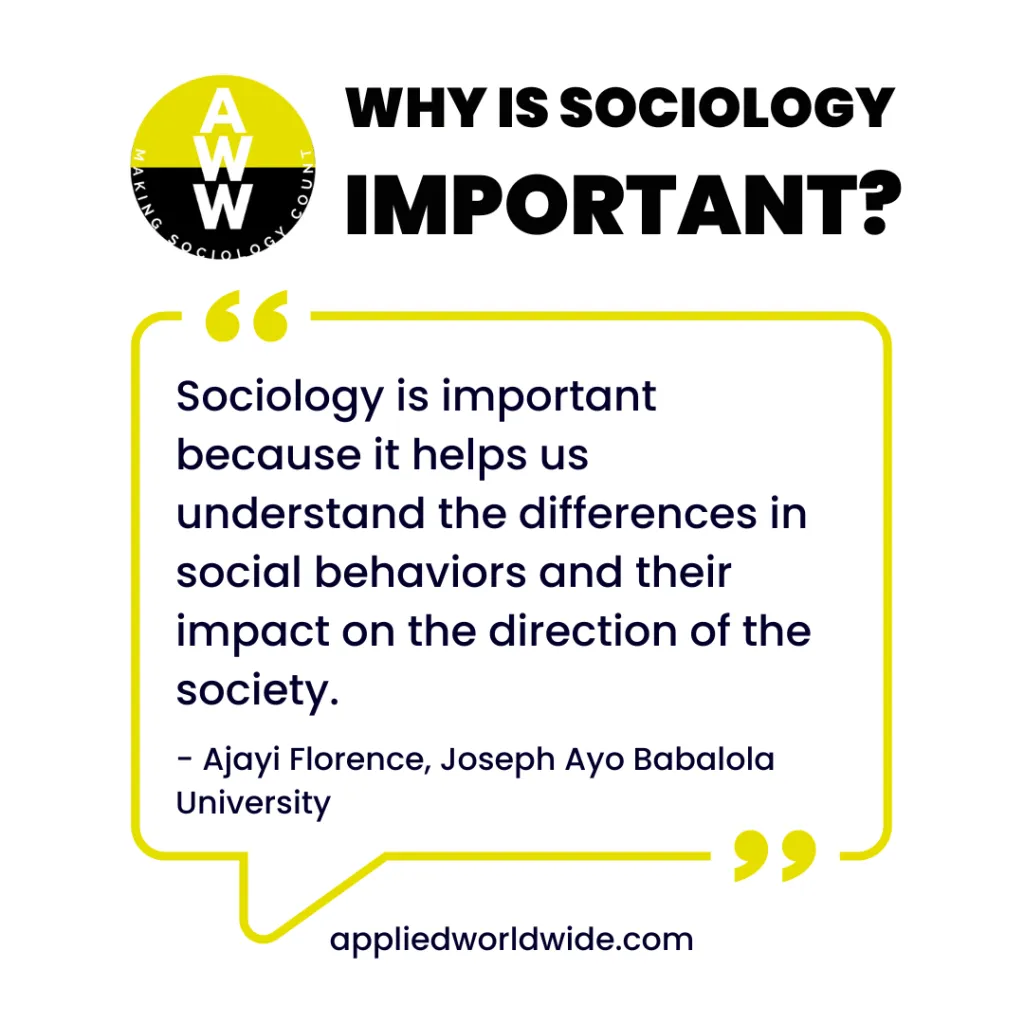
Thirdly, sociology is important because it helps us understand the differences in social behaviors and their impact on the direction of the society. This is important, considering the fact that a good knowledge of the differences in social behavior is necessary in understanding how they influence the opportunities and outcomes experienced by various groups in the society. When this social behavior comes into question, it becomes an answer of how people interact and influence each other and its resultant impact on their mental, physical, and emotional health. They are people’s behaviors shaped by their environment, social class, hierarchy, race, sex, gender and tribe. This is exemplified in the words of the social learning theorist Albert Bandura, who posited that people learn through observation and imitation of things that occur around them. A typical example is in the Nigerian slums (ghettos), where children have been exposed predominantly to negative behaviors like violence and crime, leading them to perceive these actions as the primary means of survival.
That is not all, in fact, many people tend to behave in a certain way as dictated by their social class and hierarchy in Nigeria. This is evident in the attitudes of upper-class members who socialize within their own social circle, and the members of lower-classes who socialize within their own social circle. That is why it is not surprising to see that both instances have bred insecurity and occasioned severe hinderance to meaningful development in the country. By understanding this differences through the insightful lens of sociology, public administrators will be better equipped to craft policies that incorporate formal and informal rules in order to address everyone’s behavioral needs, especially the target problem behavior.
Fourthly, sociology is important because it helps law enforcement agencies in various countries assess crime rates and mitigate their impacts. In the society today, empirical research confirms that crime is one of the problems countries all over the world have been confronted with, as many innocent people have been maimed and killed due to the activities of criminals around the world. Nations like the United States of America, Mexico, Mali, South Africa, Yemen, Afghanistan, Iraq, and Nigeria have to contend with the rising incidence of crimes like homicide, robbery, and cybercrime. The inability of security agencies to effectively combat the aforementioned crimes has adversely retarded growth and development in most countries around the world. Nevertheless, sociology is becoming an increasing tool in helping law enforcement agencies assess crime rates for an optimal solution. This is because in the sociological field, crime is studied as a social deviance and violation of established norms solved by the methods and procedures of investigative intelligence and community polling. According to the American Federal Bureau of Investigation, there are various conditions that contribute to the crime rate, which include economic conditions consisting of average income, poverty level, unemployment, and some family conditions such as divorce, family disunity, etc. It is therefore not surprising to see that many people have turned to a life of crime, and their intention to commit crime has been motivated by many sociological factors such as deprivation, inequality, poverty, unemployment, and sometimes religious degeneration. All these can be curbed and eradicated with the help of sociology. By interpreting these crimes, sociology has helped countries identify and analyze societal conditions, social behaviors, and the circumstances in which they occur. By doing this, countries have been able to address the various sociological factors that contribute to crime and the impact of their influences on crimes.
Fifthly, sociology is important because it helps add value and purpose to our basic environment and the world at large. When we talk about values, they are culture’s standard for differentiating what is good from what is bad. To add value and purpose, sociology does this by expanding our awareness and analysis of the human social relationships, cultures, and institutions that profoundly shape both our lives and human history. In the same vein, sociology does this by promoting the inclusivity of the diverse communities, cultures, and people of all areas of life in order to create a uniform understanding of our world. For instance, Nigeria as a country boasts a remarkable heterogeneity of over 460 ethnic groups that consist of various cultures, languages, and diverse religions. To carve value out of this heterogeneity, sociology will help bring the ethnic groups together to ensure their tolerance and harmony.
More importantly, sociology is of utmost importance to me in gaining insights into the complex societal changes that affect my life and the socio-political and economic factors that impact my social life. Sociology does this by equipping me with the social skills and knowledge required to understand these complex societal changes and the various factors that impact my social life. By understanding these factors, I will be better informed as an individual to make uniform and productive decisions about my life and existence.
Finally, sociology is important because it helps individuals grow interest in the socio-political and economic activities of their community. It does this by promoting the recognition of the fundamental human rights and duties that these individuals enjoy in society as humans. It also does this by promoting the inclusivity of the people as the key essence and the foundation upon which society finds its balance. By doing this, there is a continuing socio-political order and a reduction in socio-political anarchy. For instance, Nigeria is a country where the socio-economic and cultural rights that form the very fabric of the people’s existence, are not recognized as fundamental but are rather couched as fundamental Objectives and Directive Principles of State Policy. As a workable solution, sociology can help to create awareness of the essence of participatory politics and social activities in order to re-engineer our society to respect socio-economic and cultural rights. When this is done, Nigerians will be properly positioned in the country’s social and political activities, irrespective of their tribe, ideology, gender, and origin. More so, justice will not only be done but will be manifestly and undoubtedly seen to be done for the less privileged and marginalized.
Conclusion
Conclusively, the field of sociology holds great importance for both individuals and collectively as a society. The above has brought to light the immense opportunities inherent in sociology, which I firmly believe have yet to be fully explored. By recognizing the important values in sociology, individuals and governments can be better positioned to create and instigate a positive transformation in our surroundings and the global community. More importantly, you and I will be in a better position to embody the principles advocated by sociology for the continual development of our society. Therefore, it would not be inaccurate to say that we have indeed tested the wisdom of Socrates, and unequivocally, through this essay—“You and I know that we are intelligent, because we know that we know Sociology.”
Meet our 2024 Global Student Essay Competition Sponsors!
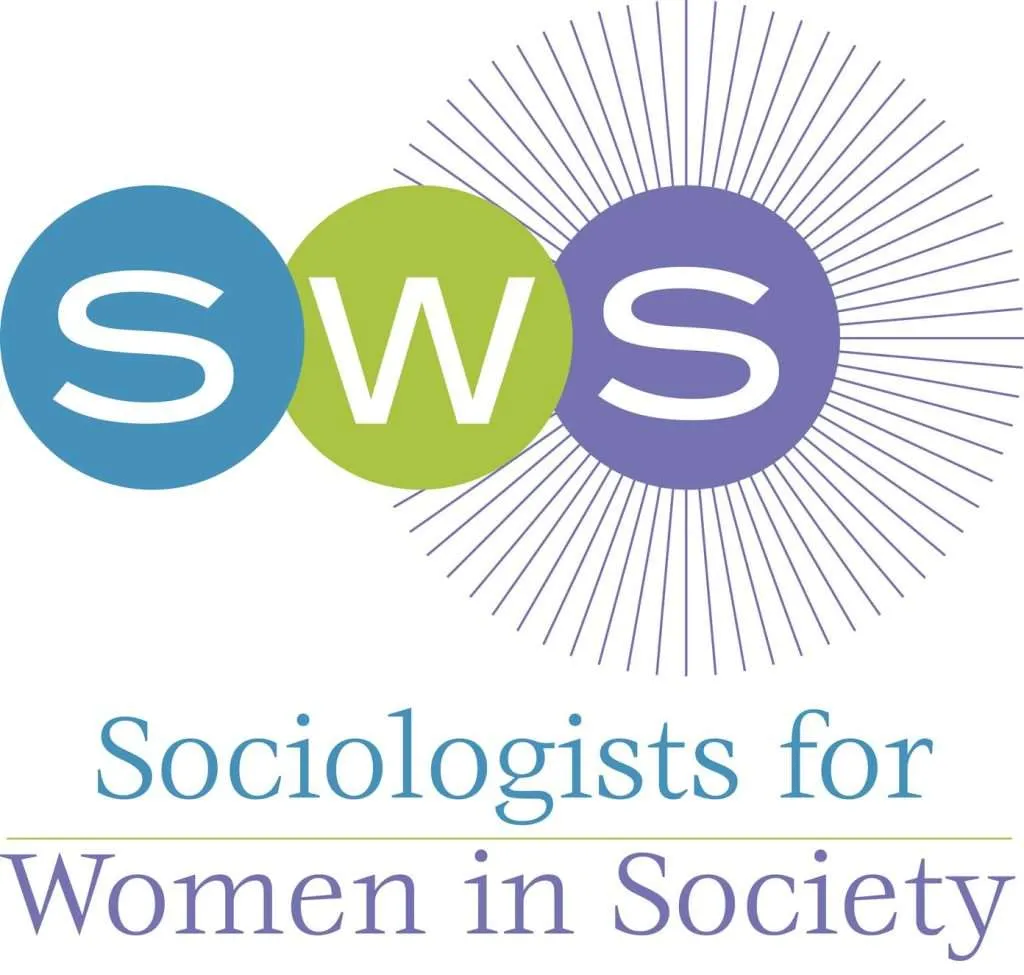
Sociologists for Women in Society is a nonprofit professional feminist organization dedicated to:
- Transforming the academy and professional organizations, including our own, by actively supporting feminist leadership and advancing career development of feminist scholars.
- Recognizing that structural inequalities impact those marginalized by their identities and that this requires proactively promoting the creation of inclusive institutional spaces in an ongoing manner and by practicing critical reflexivity.
- Advocating and encouraging the development of sociological feminist theory rooted in intersectionality and cutting-edge research for publication and dissemination.
- Promoting social justice research within local, national, and international activist spaces by supporting scholar-activist communities seeking to dismantle intersecting systems of oppression.

The Center for Equity Education (CFEE), established in 2020 as a 501(c)(3) nonprofit, addresses a gap in expert-led education for organizations, especially those with limited resources. At CFEE, our mission revolves around empowering organizations with comprehensive knowledge on federal and state civil rights, specializing in harassment and discrimination, including sexual harassment.

Hartman Castle Preservation Corporation, a 501c3 non-profit, is a A community grassroots movement formed to purchase and preserve the Hartman Castle in Gunnison, CO
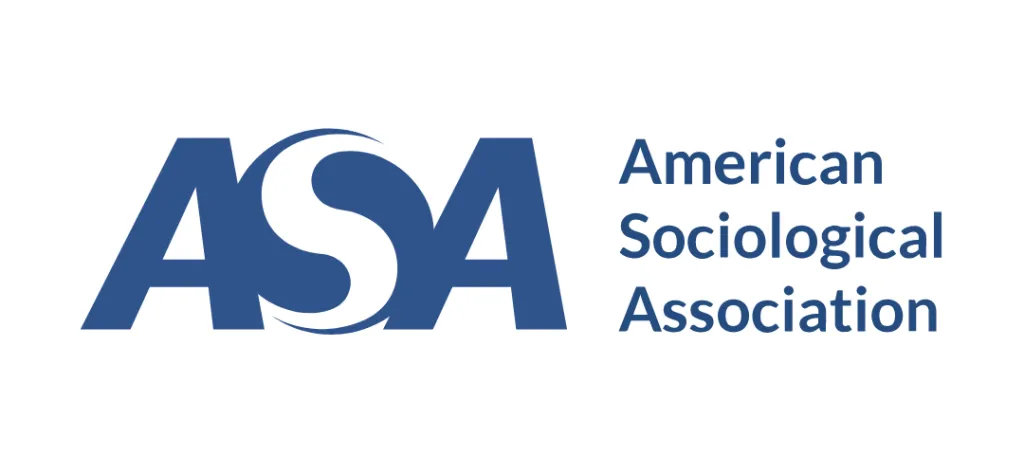
The purpose of the American Sociological Association’s Section on Sociological Practice and Public Sociology is to advance sociologically-informed research and practice, to further public discussion of sociological issues, and to promote the use of sociology to inform public policy.

Island Acres Resort Motel is a restored authentic 1950s lodging property in the style of the tourist court motel. Embracing the appeal of a bygone era, where history blends with hospitality.

Alpha Kappa Delta, the International Sociology Honor Society, seeks to acknowledge and promote excellence in the scholarship in the study of social problems, sociology, and intellectual activities that lead to the improvement in the human condition.
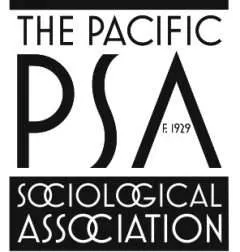
The Pacific Sociological Association is committed to serving sociologists, faculty, applied professionals, and students. We strive to create a professional community that reflects the diversity of our region and enhances the diversity of our discipline. We are committed to inclusivity and equity in our organization, to promoting social justice by examining and challenging the structural and institutional barriers in our discipline, and to building pathways for the next generation of sociologists.

The Association for Applied and Clinical Sociology (AACS) promotes applying social scientific knowledge and methods to develop constructive solutions. We provide educational, programmatic, mentoring, networking, and policy resources in a supportive professional community.


